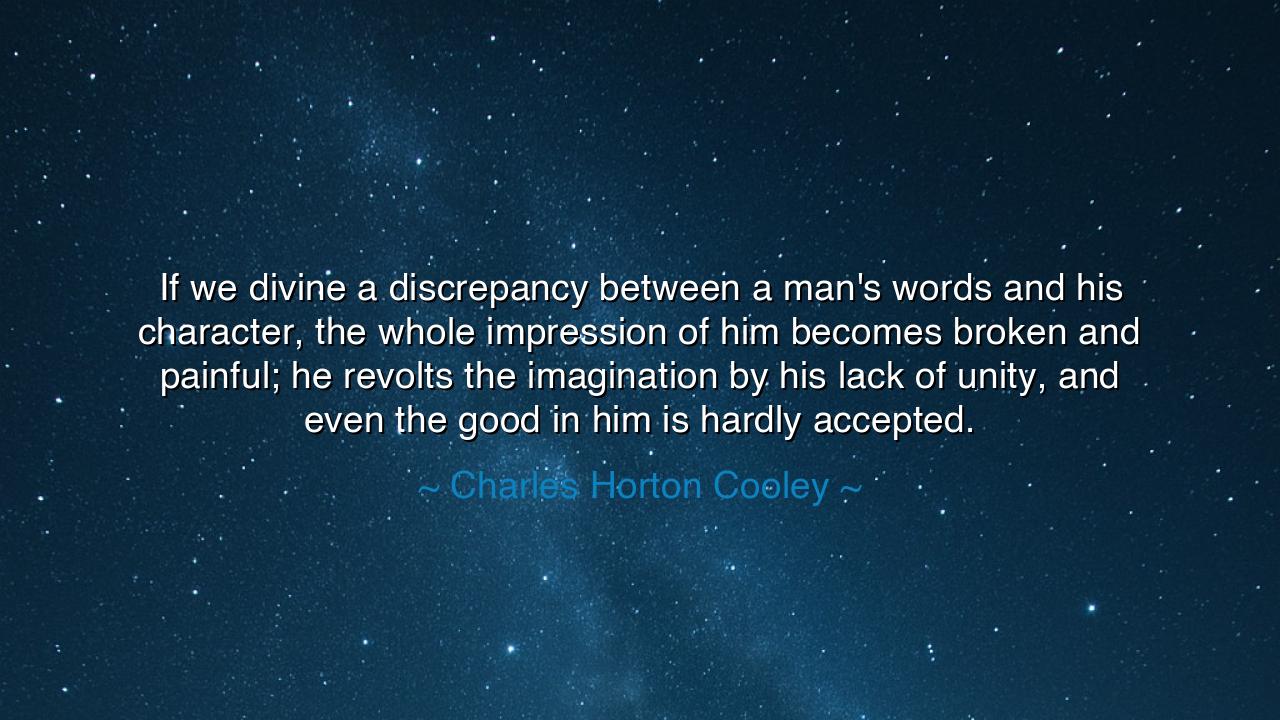
If we divine a discrepancy between a man's words and his
If we divine a discrepancy between a man's words and his character, the whole impression of him becomes broken and painful; he revolts the imagination by his lack of unity, and even the good in him is hardly accepted.






“If we divine a discrepancy between a man's words and his character, the whole impression of him becomes broken and painful; he revolts the imagination by his lack of unity, and even the good in him is hardly accepted,” wrote Charles Horton Cooley, the philosopher of the self, a thinker who peered deeply into the mirror of human nature and saw how fragile and sacred the bond of integrity truly is. His words speak not only to moral philosophy but to the very architecture of the soul — for in them lies the eternal law that truth and unity are the essence of beauty in man. When word and deed fall out of harmony, the music of the spirit falters, and what was once noble becomes dissonant.
Cooley, who lived at the turn of the 20th century, was a pioneer in sociology and psychology — the one who gave us the idea of the “looking-glass self,” that mirror in which each person sees himself reflected in the eyes of others. He understood that our moral lives are not lived in solitude but in relation, and that character is the harmony between what we are within and what we reveal without. Thus, when a man’s words say one thing and his actions another, we do not simply mistrust him — we feel something deeper, almost instinctive: a revolt of the imagination, as Cooley says. For the imagination, like the heart, craves unity, and it cannot find beauty in contradiction.
In this, Cooley joins a long line of ancient teachers. The Greeks called this unity of self arete, meaning excellence or virtue — the state in which thought, word, and action move as one. A man of arete was not divided; he was whole, and his wholeness inspired harmony in others. But when speech and character diverged, the Greeks called it hypocrisy, from hypokrites, the actor who wears a mask. To meet such a man was to feel dissonance, as if the soul itself recoiled. This is what Cooley means when he says the man “revolts the imagination” — for our hearts recognize falseness before our minds do.
History offers us a thousand examples of this truth. Consider Judas Iscariot, the disciple whose words were of love and loyalty, but whose secret act was betrayal. Though he once walked beside the Light itself, his lack of unity between word and deed shattered the image of his soul. Even his moments of remorse cannot heal the fracture — for the imagination, once betrayed, cannot easily trust again. Or think of Marcus Brutus, noble in speech but torn in purpose, whose divided heart led him to slay his friend Caesar in the name of virtue. The world remembers him not as whole, but as broken — a man who could not reconcile his ideal with his action.
Yet Cooley’s insight also carries mercy within it, for it teaches us not only to judge others, but to examine ourselves. How often do we speak of justice yet act from fear? How often do we profess love yet harbor resentment? Each time we do, the inner and outer selves drift apart, and our spirits grow uneasy. The pain of this division is not punishment, but a signal — the soul’s way of calling us back to unity, to live as we speak and speak as we live. For there is no peace in falsehood, and even our virtues lose their radiance when they are not whole.
The lesson, then, is this: be one thing. Let your word be your bond, your speech an echo of your life. Do not build your identity upon masks, for masks are fragile and must be held up with endless labor. Instead, cultivate that integrity of being which binds all parts of the soul into a single flame. When a man’s character and words are one, his presence becomes a kind of music — steady, trustworthy, and beautiful to behold. Even his flaws appear noble, for they belong to something real.
So remember, my children: it is better to stumble in sincerity than to stride in deceit. Live so that your words need no defense, and your silence speaks truth as loudly as your tongue. For the world hungers for unity of spirit, and those who achieve it — who live without the discord between promise and being — become like light in a fractured world, drawing all hearts toward the harmony of truth.






AAdministratorAdministrator
Welcome, honored guests. Please leave a comment, we will respond soon